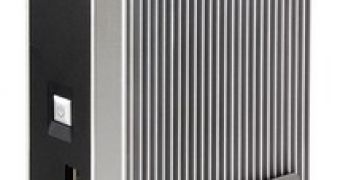Zonbu is the world's "first zero emissions personal computer" systems that is available to the general public. The whole idea behind Zonbu is a little strange to get used to over night, but it can make a difference on the market of home and office computing, where high energy efficiency, low operating noise, small space footprint and pleasant design are more important than raw and massive computing power. And don't forget the price, a typical Zonbu computer costs between $99 and $249, lower than any other computing solution on the market.
The hardware available to the potential Zonbu user is quite powerful, but it is centered on energy effectiveness and low price and not on any other considerations. The 1.2GHz processor is compatible with the x86 standard and it uses only a fraction of the power needed by ordinary desktop CPUs. Its 512MB of memory are enough for day-to-day activities and the long term storage space is made of a flash based solution with a capacity of 4GB. According to the ecogeek.org site "it can play music, movies, check email, and comes with the Open Office Suite. Really, 90% of users don't need anything more than this, and it consumes six times less power than a standard light bulb".
The catch is that users wanting more storage space will have to subscribe to the Zonbox service, as the Zonbu computer cannot be directly upgraded. Of course, as it runs a Linux distribution and comes with USB ports, an external hard disk drive can be attached. The Zonbox service provides users "free, seamless software and firmware updates and up to 100 gigs of storage space". For those users that pay two year in advance, the price of the hardware unit goes down to $99. "The cheapest plan (for 25 gigs of storage) is $12.95. But if you're switching from an older PC, you could literally save that much off your utility bill".
"Handing over things like storage and maintenance to a remote location is useful for several reasons. First, you don't have to worry about hard drive crashes and data loss. Second, by consolidating information in data centers, information can be stored more cheaply and efficiently. The result is a computing experience that is simpler and cheaper for the user, and more sensitive to the environment", according to ecogeek.org.

 14 DAY TRIAL //
14 DAY TRIAL //